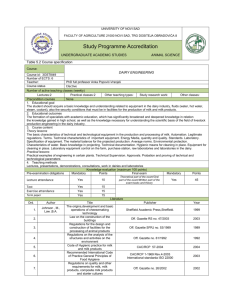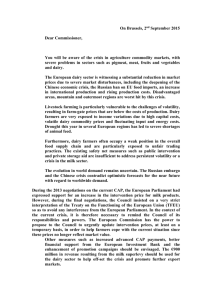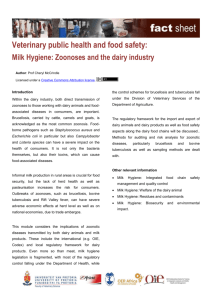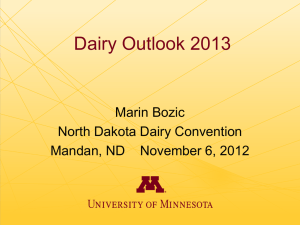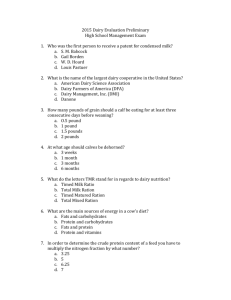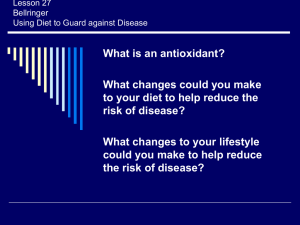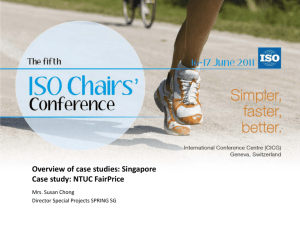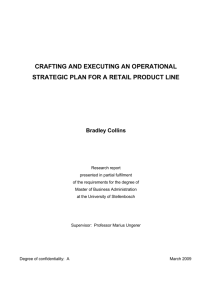Sustainable Catering at Culham
advertisement
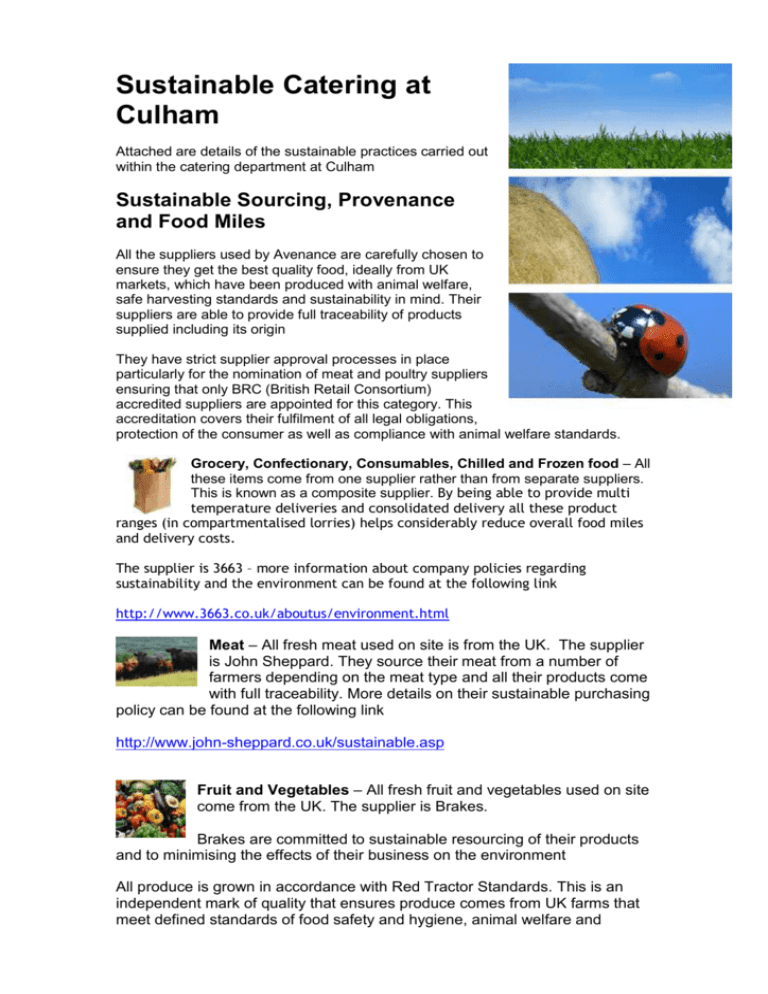
Sustainable Catering at Culham Attached are details of the sustainable practices carried out within the catering department at Culham Sustainable Sourcing, Provenance and Food Miles All the suppliers used by Avenance are carefully chosen to ensure they get the best quality food, ideally from UK markets, which have been produced with animal welfare, safe harvesting standards and sustainability in mind. Their suppliers are able to provide full traceability of products supplied including its origin They have strict supplier approval processes in place particularly for the nomination of meat and poultry suppliers ensuring that only BRC (British Retail Consortium) accredited suppliers are appointed for this category. This accreditation covers their fulfilment of all legal obligations, protection of the consumer as well as compliance with animal welfare standards. Grocery, Confectionary, Consumables, Chilled and Frozen food – All these items come from one supplier rather than from separate suppliers. This is known as a composite supplier. By being able to provide multi temperature deliveries and consolidated delivery all these product ranges (in compartmentalised lorries) helps considerably reduce overall food miles and delivery costs. The supplier is 3663 – more information about company policies regarding sustainability and the environment can be found at the following link http://www.3663.co.uk/aboutus/environment.html Meat – All fresh meat used on site is from the UK. The supplier is John Sheppard. They source their meat from a number of farmers depending on the meat type and all their products come with full traceability. More details on their sustainable purchasing policy can be found at the following link http://www.john-sheppard.co.uk/sustainable.asp Fruit and Vegetables – All fresh fruit and vegetables used on site come from the UK. The supplier is Brakes. Brakes are committed to sustainable resourcing of their products and to minimising the effects of their business on the environment All produce is grown in accordance with Red Tractor Standards. This is an independent mark of quality that ensures produce comes from UK farms that meet defined standards of food safety and hygiene, animal welfare and environmental protection. It also guarantees that food can be traced back to its source. More information on this scheme can be found on the standard website www.redtractor.org.uk More information about Brakes company policies regarding sustainability and the environment can be found at the following link http://www.brakesgroup.com/cser/ Fish – Fish is supplied by Kingfisher Fishmongers who only supply fish that are MSC (Marine Conservation Society) approved. Kingfisher are totally committed to responsible sourcing and supply of the best of the world’s catch from well-managed and sustainable fisheries. They source products within UK and International regulatory guidelines, while maintaining their commitment to actively promote greater variety and underutilised species. More detailed information can be found through the following link http://www.sustainableseafood.co.uk/ Dairy – Dairy Crest supply all dairy products. Dairy Crest is one of the UK's largest purchasers of fresh milk, buying approximately 2.4 billion litres every year, and is committed to producing food and drink to the highest standards of safety, quality and hygiene. They get their milk directly from dairy farmers as well as milk co-operatives - with 75% coming from farmer suppliers who are contracted directly to Dairy Crest. Dairy Crest buys milk from approximately 1,300 direct supplying dairy farmers, the majority of whom are located in southern and central England and South Wales. Milk from these farmers is supplied either for liquid milk consumption or for manufacture into a range of dairy products, including cheese, milk powder, butter, and cream. The milk produced by the direct suppliers is 'farm assured', ensuring that they only use top quality milk produced to stringent standards governing food safety, animal welfare and protection of the environment. The farms must comply fully with the requirements of the Assured Dairy Farm (ADF) national dairy farm assurance scheme. The ADF scheme is part of the Red Tractor Programe and focuses on all aspects of dairy husbandry and milk production. Transport As mentioned above Avenance use a composite supplier who carries multiple product lines thus reducing the number of vehicle trips to the site by bringing it all on one vehicle. These suppliers have all invested heavily in their fleet to ensure they have the most efficient refridgeration systems on board. 3663 for example predict they will save an estimated 16,800 tonnes of CO2 in the coming year by using the new systems. The suppliers also use route planning systems to ensure that their vehicles take the shortest routes when on their scheduled delivery rounds and can quickly inform their drivers of hold ups so they can avoid fuel wasting when sitting in traffic. Additionally 3663 operate 70% of their fleet on bio-fuels derived from used cooking oil which they collect from the sites they deliver to (including Culham). This means they are not taking vital crops out of the food production chain and operate a totally self renewing process. They estimate to be saving 15,000 tonnes of carbon a year across the fleet. Packaging and Disposables Many suppliers supply their deliveries in re-usable containers such as roll cages and plastic crates to minimise the amount of packaging that has to be disposed of. One of our suppliers takes their cardboard packaging away with them and we are working with our other suppliers to do the same.Any residual cardboard packaging is recycled through the site general waste contractor. The caterer is required to use recyclable disposables where possible (drinks cups, sandwich wrappers etc) and recycling facilities are available in the main restaurant and around site. Napkins are made from 100% recycle paper and are unbleached Waste and Recycling All the waste generated by catering at Culham is managed by the Authority. Cardboard, cans, glass, plastic bottles, Costa Disposable cups and paper all go for recycling. Food waste is collected seperately. This is taken to a fully licensed Anaerobic Digestion plant where naturally occuring micro organisms break the food down into compost used for agricultural and horticyul;tural purpses. A by product of the process is bio-gas which is used in a Combined Heat and Power plant for the production of heat and electricity. Our coffee grounds are avaialble to site staff free of charge as they have many uses. See below for details

